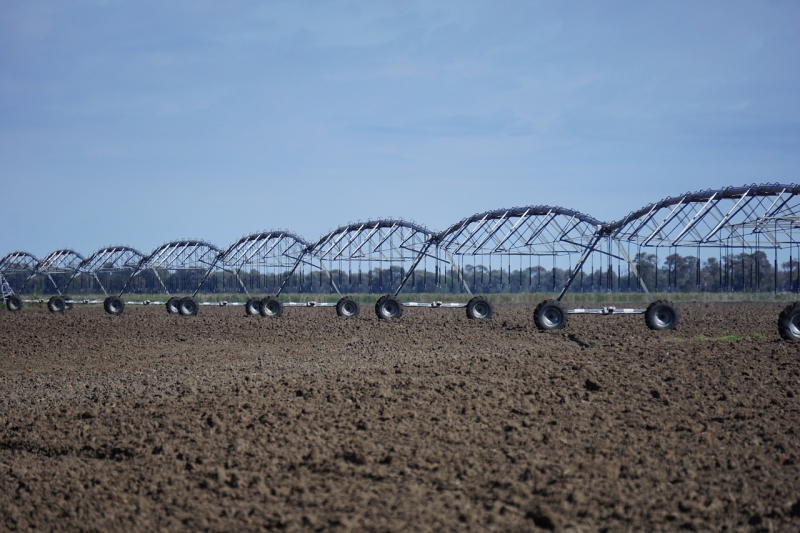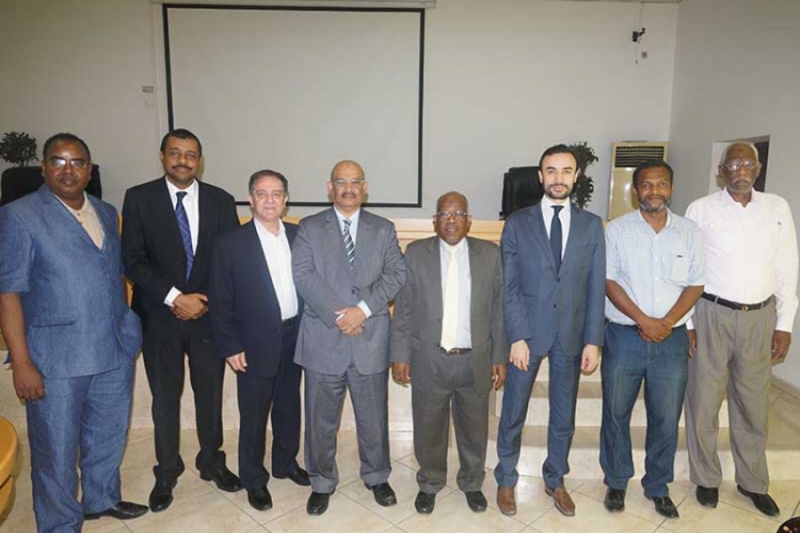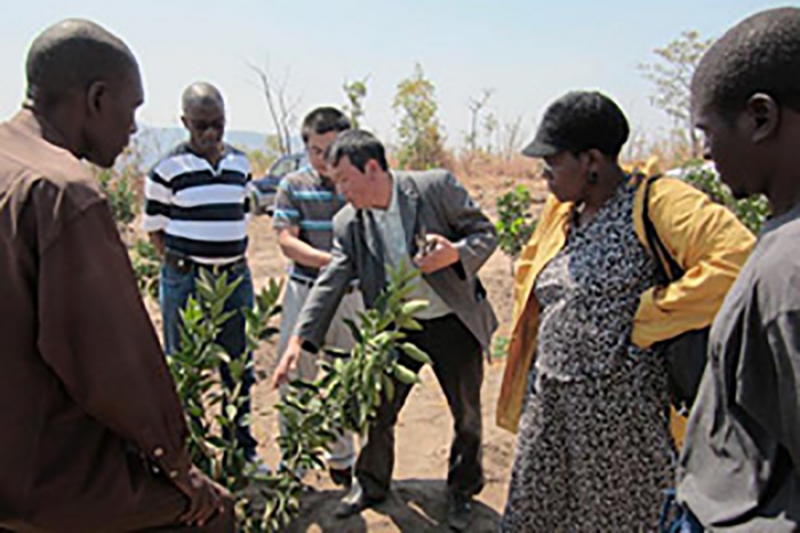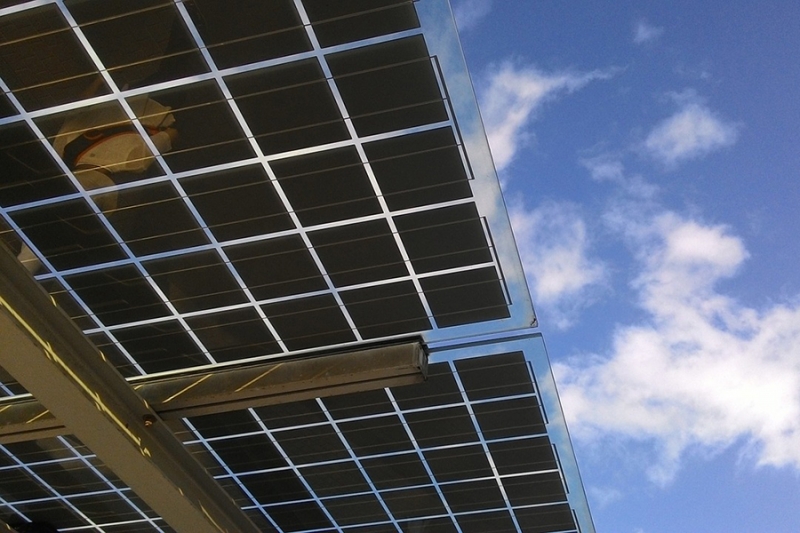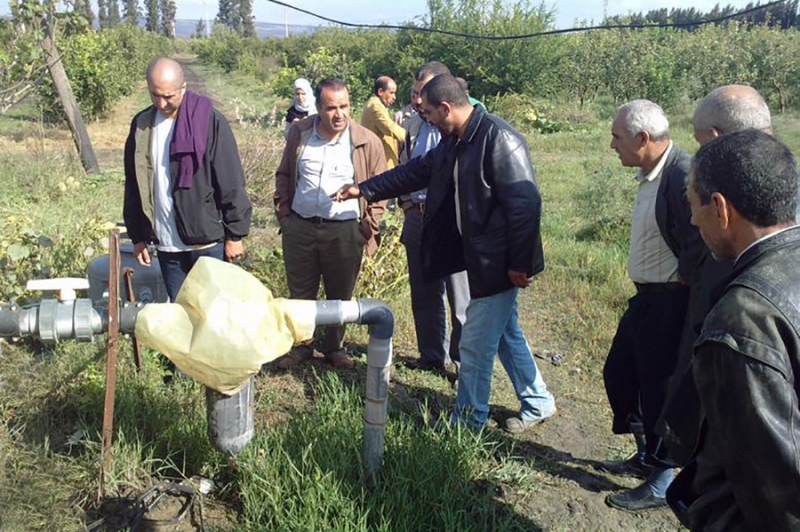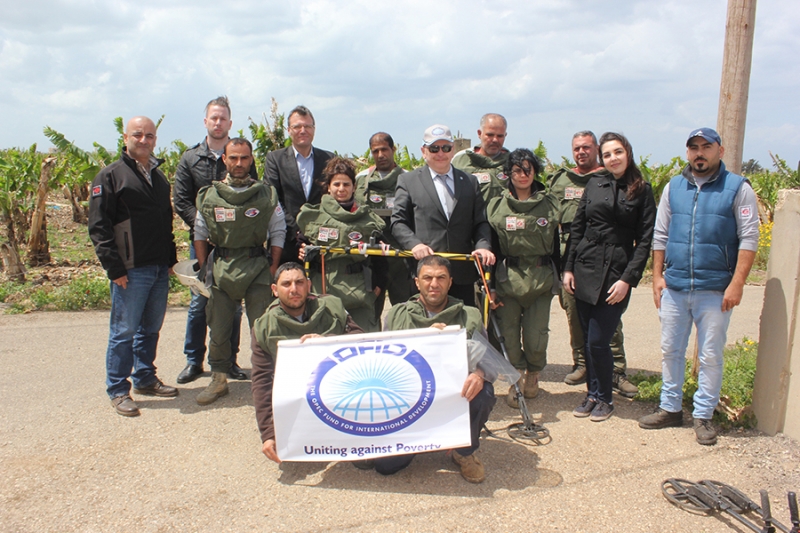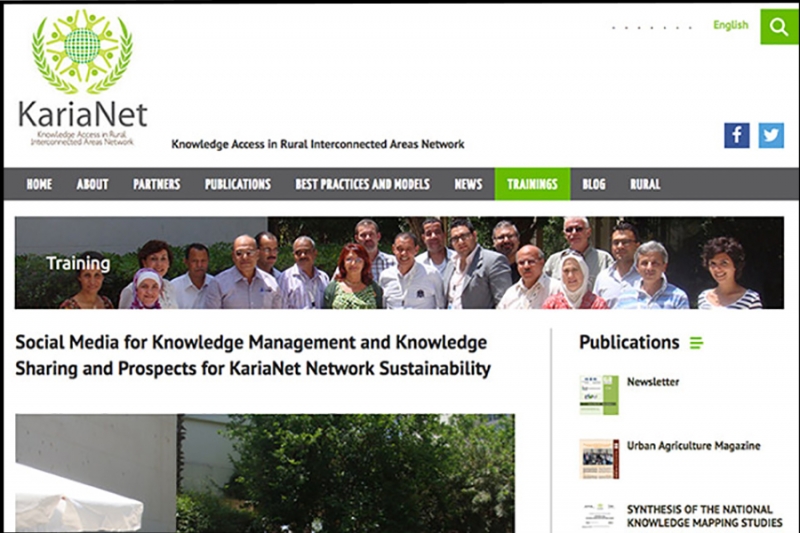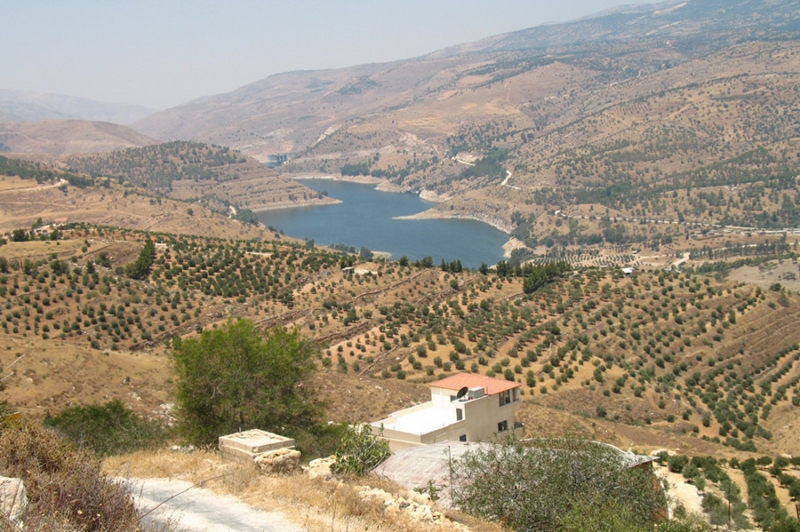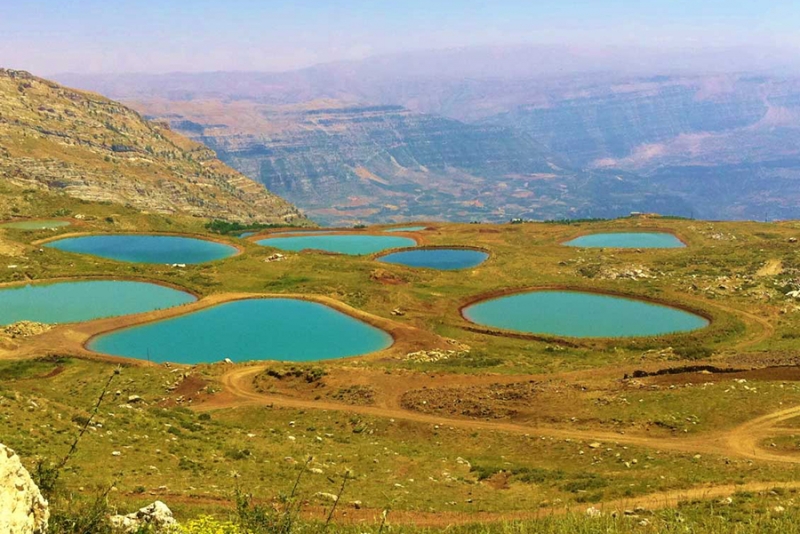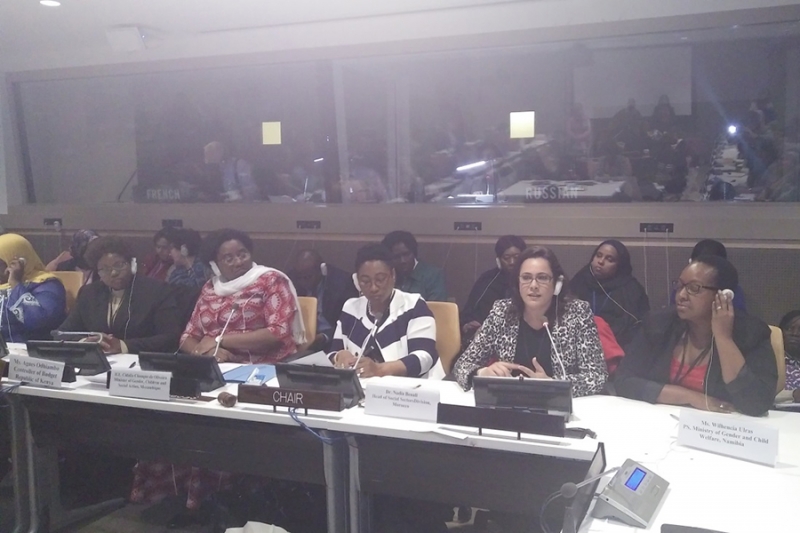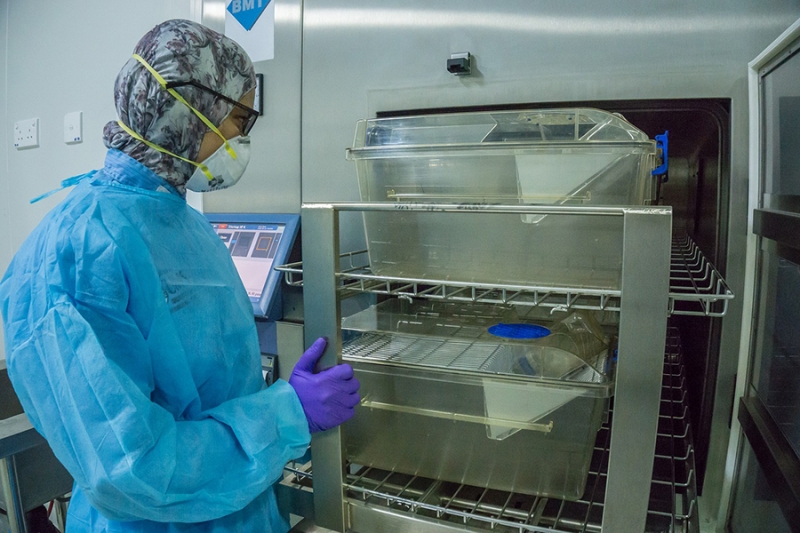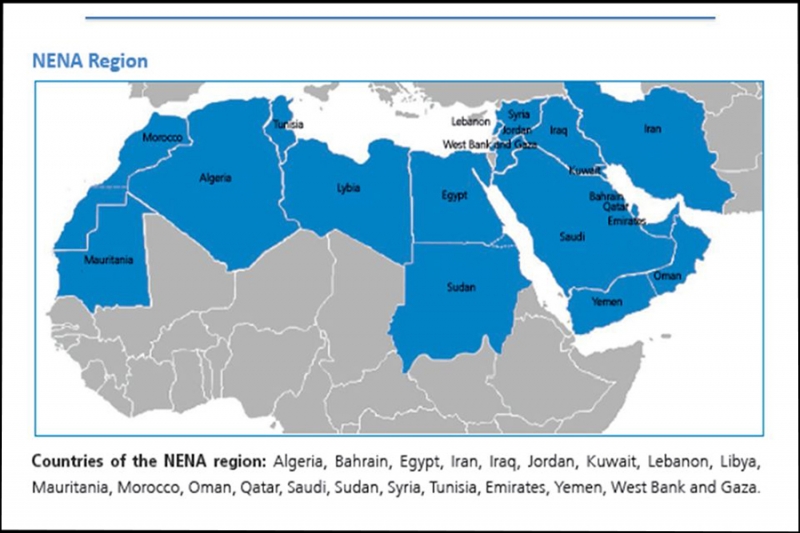The programme aims to promote technology packages to improve livelihoods of poor farmers and pastoralists in the Arabian Peninsula through the adoption of sustainable production and natural resource management technologies in the limited water resources environment and areas affected by desertification.
The Programme resulted in:
- substantial water conservation and increased fodder production from the adoption of water use-efficient of indigenous forages, particularly Buffel grass;
- reduced use of pesticides; and
- increased yields and income from the adoption of integrated production and protection management (IPPM) practices and hydroponics.
The objective of the programme is to improve the livelihoods of small-scale farmers through the development and adoption of sustainable natural resource management technologies focusing on forage production, rangelands rehabilitation, protected agriculture and related capacity building on water use efficiency.
Three sets of production technologies were developed:
- Improved technologies for open field production of high water use-efficient indigenous forages, such as the native Buffel grass with an average annual water requirement of 15 000 m3 compared to the commonly used Rhodes grass with an average annual water requirement of 35 000 m3 (resulting in an average water conservation of 57%); and
- High-value cash crops in soil and soilless culture-based production technologies under protected agriculture. The second set consist of promising production technologies for the recently introduced spineless cactus, currently in an advanced stage of selection and adaptation trials for use as green fodder and ingredient for quality feed blocks in combination with on-farm and agro-industry by products.
- Improved technology elements for rangelands rehabilitation, is at an early stage of development and assessment at research stations.
An impact assessment carried out in December 2013 revealed that the farmers are satisfied with the technology packages developed on indigenous perennial forages, IPPM and soilless culture. The following average adoption rates were reached on a regional basis: 54% for protected agriculture, 38% for perennial forages, 22% for IPPM and 5% for soilless culture. There was a sevenfold increase in water productivity (48 kg tomatoes/m3 water in soilless culture versus 7kg/m3 in soil-based protected culture in UAE). Due to the adoption of IPPM technology, the use of pesticides was reduced from 40% to 60% in the greenhouses.
The yield of tomatoes increased by 192% in soilless culture compared to soil-based protected culture in UAE. The external evaluation concluded that the APRP research work is of high return and confirmed that both the open system soilless culture as well the closed system with automatic control of nutrients are the way forward for the intensification and diversification of protected agriculture production systems for high return cash crops in the context of an increasing water shortage and salinity in the Arabian Peninsula.
Partners: The overall cost of the Program, on a grant basis over three phases, amounted to USD 10.18 million of which 52% was provided by AFESD, 31% by IFAD, 13% by UAE, and 4% by OFID. The UAE contribution directly covered the cost of rented office facilities and utilities for the Program Regional Coordination Unit in Dubai hosted by the Ministry of Environment and Water.
Contact details:
Abdelkarim Sma
Country Program Manager
IFAD/PMD/NEN
Via Paolo di Dono 44
00142 Rome, Italy
Tel. +39 06 5459 2500
Fax + 39 06 5459 3500
Email: This email address is being protected from spambots. You need JavaScript enabled to view it.
Geographic focus: All the Arab states; all the 56 member countries are eligible to participate in this Programme, including the Arab states.
The Technical Cooperation Programme (TCP) is one of the main arms of IDB for human resource development in member countries. It is a South-South cooperation grant based programme focusing on transfer and exchange of skills, knowledge and know-how amongst member countries. Built around a tripartite scheme, this programme involves three partners in each of its activities; namely: a technical donor, a beneficiary and IDB as a facilitator.
The basic objectives and functions of the Programme are:
a) To mobilize the technical capacity expertise and training capabilities of IDB Member Countries for the purpose of fostering collaboration amongst them.
b) To promote opportunities for exchange of experience and information and appropriate technologies suited to the development needs of member countries
c) To alleviate the managerial, technical and institutional constraints, which retard project implementation and efficiency.
d) To intensify the matching of needs identified in member countries with capacities available in other member states and to promote closer partnership.
Modalities and Procedures:
To be eligible to benefit from this programme, all the applications must be supported and endorsed by the Office of the IDB Governor or the National Focal Point for the country concerned. In terms financing, since the programme is based on a tripartite approach, financial contributions are expected as well from the donor country and the beneficiary/host country.
As part of capacity development in the Member Countries, TCP utilizes three vehicles for the promotion and accomplishment of the objectives of the programme:
- Recruitment of Experts. The experts are recruited to help IDB member countries to prepare a specific study or to provide advisory services for capacity building purposes. The transfer of knowledge and know-how of the expert to the member countries is a key feature of the programme, which complements the capacity building efforts of the beneficiary in the desired field. In this regard, the beneficiary country must specify its needs and the desired assignment in details to be undertaken by the experts. In addition to the nature and tasks to be performed under the assignment, a definite period for execution of the assignment should also be stipulated, while taking into account that the maximum period for an expert`s assignment is six months.
- Provision of On-the-Job Training (OJT). OJT vehicle aims to augment the skills and enrich the experience of technical and professional staff. It consists of the two main types, namely Formal Training and Study and Familiarisation Visits.
- Formal Training
Training courses are organised for the middle management and technical officials in public or private organizationsin order to upgrade their skills and knowledge and improve proficiency in their performance. For the organization of training courses, the beneficiary institution/country must recommend candidates for short-term training (maximum 4 months) and it must ensure to prepare clear justifications highlighting their needs and the area in which they would like to enhance their knowledge and expertise. - Study and Familiarization Visits
These visits are targeting the senior-level officials at the level of heads of ministries, organizations and departments with the objective of acquainting them with the activities and structure of similar institutions/ industries of other member countries and helping them in enriching their experience and knowledge.
- Formal Training
- Organization of Workshops and Seminar. Seminars and workshops provide the beneficiary countries with the opportunity to exchange experiences on a specific subject and, hence enhancing their knowledge and understanding in that area. For the workshops and seminars, the countries and organizations presenting seminar/workshop proposals are required to submit detailed information on the background and objectives of the respective seminar/workshop and to justify how these events would address the needs of the country. If any professional speakers are required for the event, the Organizer would send to the potential speaker candidates a brief information bulletin giving a synopsis of the content of the seminar/workshop, the programme, the target group and the qualifications and experience they should possess.
Benefiting Countries:
Bahrain, Comoros, Lebanon, Mauritania, Morocco, Saudi Arabia, Tunisia
Results to Date:
Since its inception in 1983 to the end of 2012, 2,006 operations have been approved under the programme:
- 370 operations were for recruitment of experts
- 880 operations were for on-the-job training
- 756 operations for seminars and workshops.
To date, the TCP facilitated the training of more than 15,000 persons while it enabled approximately 500 experts to be dispatched among member states. Additionally, more than 16,200 specialists have had the opportunity to share their knowledge and experiences in various fora.
Total Budget (USD): Around 46 M
Geographic focus: Yemen covering some governorates such as Sana'a, Taiz, Dhamar, and Aden.
Thematic areas: Agriculture, food security through improvements in water control, crop intensification, and diversification
Development challenge and key achievements:
The fielding of four field technicians over a two-year period, from August/Sept 2006 till August/Sept 2008, resulted in an enhanced capacity of the national technicians and farmers and contributed to increased agricultural production and food security in the country. Production activities covered some components of the SPFS, such as water control, crop intensification, marketing and diversification, including small animal production as well as other areas of priority importance to the country.
The project assisted in establishing integrated models of irrigation techniques to improve water use efficiency. It also conducted trainings and support for farmers, extension staff and agricultural agents in water conservation and management practices, and supported the introduction of high-value cash crops, the olive growing and cropping and the improvement of marketing of agricultural products. The project also provided extension for households owning livestock.
The main beneficiaries of the programme were small farmers and consumers. Farmers were able to intensify production, produce off-season, and ensure a more regular supply on the market, thereby derived increased incomes. Consumers benefited from more regular supplies, improved standards and better food quality.
Solution Details: The comparative advantage of the solution:
The project permitted the fielding of 4 technicians from Jordan over a two-year period with the following expertise:
- Crop Production
- Irrigation
- Marketing
- Livestock
South-South Cooperation between Yemen and Jordan has been a practical technical assistance, facilitated by FAO at development and implementation levels. The FAO comparative advantage was mainly reufb02ected in SSC legal, operational and technical framework, the response to the specific needs of the recipient country since the project formulation, the follow up of the SSC activities through the FAO Representation and backstopping, and the work of SSC partners directly with farmers and their technical national counterparts.
Most Recent Annual Budget (USD): 350,000
Total Budget (USD): 350,000
Focal Point and Contact:
Fathi Hadhri, South-South Cooperation Officer FAO, HQ
Viale delle Terme di Caracalla,
00153, Rome Italy
Email: This email address is being protected from spambots. You need JavaScript enabled to view it.
Solar Energy Farming offers a highly innovative and triple-win NEXUS approach which links water security, energy security, and food security.
Water Security
- Solar farming reduces groundwater abstraction, thus saving the country`s strategic water reserve for future generations.
Energy Security
- Solar farming reduces Jordan's heavy dependence on imported fossil fuel and gas and therefore lowers expenditure of foreign currency for fuel and gas import to their land.
The solution saves vital groundwater resources for future generations by applying an economically lucrative and environmentally sustainable climate change adaptation measure, i.e. solar energy farming (photovoltaic). Farmers install solar panels on their lands that prevents further expansion of irrigated agriculture, thus reducing groundwater abstraction.
The solar energy farming diversifies farmers` income and generates a 10-fold potential increase in net earnings as compared to irrigated agriculture. Moreover, solar energy farming leads to a greener economy as farmers shift from fossil fuel energy consumers (water pumping) to clean energy producers (photovoltaic).
Partners: GIZ regional programme u201cAdaptation to Climate Change in the Water Sector in the MENA Region (ACCWaM), the Ministry of Water and Irrigation of Jordan, the Ministry of Energy and Mineral Resources of Jordan, the Arab Ministerial Water Council (League of Arab States) - Arab Region (Scaling-up)
Contact details:
GIZ-Cairo Office
4 D, El-Gezira Street, 3rd Floor
11211 Zamalek, Cairo, Egypt
Adaptation to Climate Change in the Water Sector in the MENA Region (GIZ)
00962 65 65 92 06 (Jordan) | 00 20 120 22 77 811 (Egypt)
Dr. Bassam Hayek (GIZ) | Dr Gerhard Lichtenthaeler (GIZ)
Email: This email address is being protected from spambots. You need JavaScript enabled to view it., This email address is being protected from spambots. You need JavaScript enabled to view it.
Countries: Algeria, Morocco, Tunisia, Near East and North Africa
The solution seeks to support local irrigation systems in 3 countries of the North Africa, namely Morocco, Algeria and Tunisia, and contribute to the global debate on irrigation by developing and strengthening a multidisciplinary network with 60 researchers, teachers and PhD students from North Africa and France. SIRMA is a partnership-based skills network which is part of a collective of 23 Platforms in Partnership for Research and Training.
The solution contributes to the development of irrigation systems by:
- Reinforcement of irrigation associations and agricultural cooperatives with building the expertise in collective irrigation management through professional training;
- Training of scientists and engineers on the problems and solutions in irrigation management in various countries and situations
- Production of sound and critical research and studies on the major issues faced by the irrigated agriculture in the Mediterranean region;
- Formulation of policy recommendations on the management of water resources.
SIRMA serves as an expertise hub and a bridge between the major agricultural engineering universities in North Africa and local irrigation associations, irrigation managers and policy makers.
The essential feature of the solution is direct involvement of local farmers' organizations in the process of developing new solutions in water and irrigation management in partnership with researchers and water and irrigation managers. The solution has proved that the capacity building of farmers' organizations has a direct impact on the management of irrigation systems (allocation, distribution, application), and, in general, has a multiplier effect in other domains related to agricultural production and local development.
The solution can be scaled up by extending SIRMA to the East of the Mediterranean, which will be of mutual benefit to the members of the network and new partners, bringing in new potential, knowledge and skills to the solid ground of the existing expertise in the network.
The estimated budget for the solution is USD 1.4 millions required for the networking and development of 1) professional training for irrigation associations, 2) common training modules at BSc and MSc level and 3) action research.
Partners:
International Centre for Agricultural Research for Development (CIRAD), Institute for Agronomy and Veterinary Medicine Hassan II (IAV), National School for Agriculture Meknes (ENAM), National High School for Agronomy Algiers (ENSA), University Centre of Khmis Miliana (CUKM), National Institute for Rural Engineering, Water and Forests, Tunis (INRGREF), National Institute for Agronomy of Tunis (INAT), Institute for Research for Development, Marseille (IRD), National Research Institute of Science and Technology for Environment and Agriculture (IRSTEA), Mediterranean Agronomic Institute of Montpellier (CIHEAM), Paris Institute for Technology for Life, Food and Environmental Sciences (AgroParisTech), National Institute of Further Education in Agricultural Science, Montpellier (SupAgro).
Contact details:
CIRAD
Avenue Agropolis, 34398 Montpellier Cedex 5, u2028France.
IAV Hassan II
Medinat El Irfane, Rabat, Morocco.
Dr. Marcel Kuper
Phone number: + 212 6 71 43 46 79
Email: This email address is being protected from spambots. You need JavaScript enabled to view it.
The relationship between OFID and the Palestinian people dates back more than three decades. During this time, OFID has worked hard, through the provision of grant assistance, to lay foundations for the empowerment of palestinians in the West Bank and Gaza Strip, as well as for those in refugee camps in neighbouring countries. Today, these people are enduring one of the most challenging periods of their turbulent history. Despite these challenges, however, life must go on. Palestinians still need to support themselves, they still need to raise and educate their children, and they still need the basic essentials such as food and shelter. Recognizing this, OFID`s support to Palestine reaches deep into people`s everyday lives, building human capacity and focusing on projects that offer Palestinians the hope of a long-term, sustainable future. In uniting with the Palestinian people, OFID has co-financed hundreds of projects, extending valuable lifelines to this vulnerable population as they pursue their dream of an independent and secure Palestinian State.
OFID offers both targeted accelerated assistance, known as the Special Grant Account for Palestine and the Pal Fund to work on micro-financing for projects in Palestine.
Results to date:
Regarding its specific partnership with the UNDP Palestine programme OFID has worked on providing solar renewable energy in the region. Under its joint programme with UNDP 4 schools will be operated through the use of solar cells for lighting purposes where school students became familiar with the use of such type of alternative power resources and expressed their willingness to learn more about the possibility of using this technology in their houses. The donor was satisfied with the implementation of the project and the progress reports delivered at the exact dates along with the disbursement.
Countries that benefited:
Egypt, Djibouti, Jordan, Lebanon, Morocco, Mauritania, Palestine, Tunisia
Most Recent Annual Budget (USD): 1,000,000
Total Budget (USD):5,293,000
Focal Point and Contact:
Iman Al Husseini
Infrastructure
UNDP/PAPP
Omar Bin Abdel Aziz Street, Al Remal
Gaza
+972599606775
Email: This email address is being protected from spambots. You need JavaScript enabled to view it.
The first-of-its-kind Knowledge Access for Rural Inter-connected Areas Network (KariaNet) was established as a regional network for the management and sharing of knowledge, information and experience in agriculture and rural development in the Near East and North Africa (NENA) region.
In its second phase, the Network embraced u2018open access principles', and through the use of ICT and non-ICT tools made knowledge available to its stakeholders, consisting of development practitioners, government agencies, researchers, private sector as well as national and regional NGOs involved in rural development.
The aim was to link up the knowledge providers and knowledge brokers with knowledge seekers (two-way knowledge flow) through three thematic networks:
- knowledge management systems and practices in agriculture and rural development;
- food security; and
- rural enterprise development.
The Vision:
KariaNet aims to enhance the overall performance and effectiveness of development projects in MENA, to enable the rural poor to overcome their poverty.
The Objectives:
- To initiate and sustain a knowledge management hub that builds on and expands the existing networks and initiatives on knowledge management and knowledge sharing in rural development in ten countries in the MENA region;
- To build and sustain national and regional competences needed in networking in knowledge management in food security and rural enterprise development.
- To enhance knowledge sharing and management culture and practices supported by the use of ICT`s and non-ICT`s tools for agricultural and rural development.
- To sustain the network after KariaNet II.
The beneficiaries: Algeria, Egypt, Jordan, Lebanon, Morocco, Palestine, Sudan, Syria, Tunisia and Yemen.
Since 2010, KariaNet II has been testing different methodologies to enhance knowledge exchange across projects, such as learning routes, learning alliances, action research projects and innovation contests. The beneficiary countries in the region were diverse in terms of their contexts, needs and languages, so sub-regional activities were planned in addition to national and regional ones. This created synergies and allowed for productive engagement in issues of common concern.
- KariaNet built a regional network with 390 members, trained in documentation and systematization, in how to use KM-KS tools and methods, how to build online KM communities using social media.
- Implementation of 35 face-to-face activities including: 14 regional-level workshops and review meetings, and 21 national-level workshops and capacity-building activities.
- Knowledge mapping studies were completed in nine countries to assess the status of KM-KS. These were synthesized into a regional report and policy briefs on the status of KM-KS in MENA.
- Three action research activities on KM-KS were initiated in Algeria, Egypt and Palestine as a state-of-the-art work on knowledge management in the region.
- The website (www.karianet.org) served as a repository of knowledge in three languages: English, French and Arabic
- Google groups evolved into communities of practices, with exchanges around KM-KS (documenting, systematization, learning routes) focusing on regional priorities including water management, farmers` organizations, and access to market
In 2013, the Network was successfully devolved to the Environment and Sustainable Development Unit of the American University of Beirut - the new regional host of KariaNet. The regional projects continue to benefit from the successful methodologies.
Partners: IFAD, IDRC, IFAD-financed projects in the NENA region and the Environment and Sustainable Development Unit of the American University of Beirut.
Contact details:
Abdelkarim Sma
Country Program Manager
IFAD/PMD/NEN
Via Paolo di Dono 44
00142 Rome, Italy
Tel. +39 06 5459 2500
Fax + 39 06 5459 3500
Email: This email address is being protected from spambots. You need JavaScript enabled to view it.
The Agricultural Resources Management Project (phase 2 is implemented through five local community support units in the agricultural lands the governorates of Karak, Tafila and Ma`an in southern heights in Jordan.
The project aims at improving food and water security; and increasing the level of income of targeted groups through local community development and empowering women to actively participate in the usage, administration, and preservation of land and water resources.
The project objectives are to:
- Form water users associations to make farmers participate in the administration maintenance, and preservation of springs and waterways;
- Rehabilitate springs and padding waterways in order to improve the efficiency of springs and minimize water waste, which would increase the amount of water reaching farms and trees;
- Renovate perennial olive trees and encouraging farmers to cultivate new plants and improve production techniques;
- Train farmers on agricultural best practices in the maintenance of springs and waterways.
The project activities include building capacity of the farmers through trainings on best techniques of irrigation, rehabilitation of perennial olive trees and management of the demand, utilization and preservation of water, providing chemical fertilizers, spraying insecticides, and paying for trimmers, protecting springheads and building small tanks in farms for accumulation and pumping of water.
The project efforts have led to:
- Improving access to the water in the springhead;
- Increasing water flow to the spring;
- Reducing the rate of water wasted directly from the soil or through evaporation ;
- Making water reach agricultural land in an easier manner;
- Increasing cultivated areas and increasing the productivity of irrigated trees;
- Saving time and efforts exerted in the irrigation of trees.
Partners: IFAD and local communities
Contact details:
Jordan
Mamoon Al Adaileh,
Ministry of Agriculture
ARMPII - SLM officer
Phone: 00962799059149
Fax: 0096232322875
Email: This email address is being protected from spambots. You need JavaScript enabled to view it.
In the hilly areas that have been neglected – and/or affected by the July 2006 war – the project addresses opportunities for farmers to increase their output and income through:
- raising agricultural productivity, improving quality of products and lowering production costs for existing farming systems, which are based mostly on fruits and vegetables;
- adding value through post-harvest support services to increase farm profitability and income; and
- enhancing processing and marketing services with local enterprises and generating employment to assist those without sufficient land resources.
The solution’s design includes:
- improvements in soil and water management and development of small and medium-size water harvesting and soil and water conservation measures;
- improvements in agricultural productivity and market linkages for small farmers by provision of technical support services; and
- strengthening the capacities of the project implementing agencies and farmer organizations.
Focus areas of the project were selected based on the following criteria:
- Areas affected by the war
- Areas with limited agricultural productivity capabilities
- Areas most vulnerable to desertification.
Sustainable water harvesting and efficient use of excess runoff and spring flow, in addition to soil and water conservation measures and modern irrigation are considered as climate change enabling activities supporting long-term and short-term mitigation measures and adaptation. Water harvesting technique through small mountainous lakes are less environmentally damaging compared to bigger water dams, and thus are of relatively positive environmental impact.
Since the project implementation small hill lakes (reservoirs) have been constructed, ranging in size from 20 000 to 50 000 cubic meters, on a pilot basis, for storing water from springs, runoffs and harvested rainwater to be for irrigation by small groups of farms.
The project provided water for lands which were left fallow due to shortages of water and increased the interest in recultivating the abandoned areas and due to the project intervention:
- Cropping intensity increased and the cultivated land area increased;
- Farmers became more willing in investing in water harvesting techniques such as terracing and small concrete reservoirs;
- Increasing water harvesting coupled with the use of modern irrigation techniques at the farm level became a more economical way of increasing water availability, yields, production and income, particularly for the poor smallholders.
Partners: The Ministry of Agriculture, the Green Plan, Farmer groups and Water Users Associations, municipalities, private contractors and consultants, IFAD, OFID, Government of Lebanon
Contact details:
Lebanon
Eng. Ali El Hajj
Coordinator of Comp. 1, HASAD
Email: This email address is being protected from spambots. You need JavaScript enabled to view it.
Knowledge Network: Morocco
Geographic focus: The GRB centre is a global centre open to all countries. The centre is based in Morocco with a specific focus on Arab-speaking and French-speaking countries.
Thematic areas:
- Gender-based assessment of public policies
- Results-based and gender sensitive public finance management
- Gender sensitive statistics and data
- Gender responsive planning and budgeting at local level.
Steps/stages:
The Moroccan Gender Responsive Budgeting (GRB) centre of excellence was launched in November 2012 during an international high-level conference on GRB held in Morocco. More than 30 countries from Africa, Asia, Europe and Latin America participated to this exchange. During 2012, an electronic platform of the centre of excellence was elaborated. It is a system for GRB knowledge management that allow setting up different communities of practice made up of members wanting to share, innovate and learn together.
Before the official launch of the centre, south-south exchange workshops were organized to experiment this mechanisms. A first workshop on GRB for officials representing ministries of finance, sectoral department and statistics institutions from Morocco, Algeria, Tunisia and Mauritania was organized on November 2010. Another bilateral workshop was organized on December 2012 for officials from Morocco and Tunisia.
Results to Date:
- A knowledge management electronic platform for Gender Responsive Budgeting knowledge
- A website sharing global knowledge on GRB : www.grbmorocco2012.com
- More than 20 presentations on different topics related to GRB: normative and policy environment for GR/GRB countries experiences / Accountability tools for Gender Equality / GRB approaches and budgetary programming/ democratic space for gender-responsive budget/ Public Financial management reforms and gender-responsive outcomes in context of crises
- 17 country profiles on national gender responsive budgeting experiences
- Other documentation on GRB and gender
- A list of national experts on gender responsive budgeting
Focal Point and Contact:
Mohamed Chafiki
Directorate of Studies and Financial Forecasts
Ministry of Economy and Finance
32 Rue Honain Angle, Avenue Michlifen
Agdal, Rabat
Morocco
Email: This email address is being protected from spambots. You need JavaScript enabled to view it.
The Regional Centre for Plant Genetic Engineering and Biotechnology was established in Doha in support of Qatar`s efforts to develop the region`s agro-genetic engineering capacities.
The Center will serve as an international Center of Excellence for scientific research in the field of genetic engineering and biotechnology as well as a know-how and information hub for regional centers and research institutions in Arab countries. By pioneering state-of-the-art research solutions related to plant genetic engineering and biotechnology, the Centre will contribute to increased agricultural production and improved nutritional quality of food, crucial to food security and poverty reduction efforts in the Arab region.
The objectives are:
- To develop and promote the application of biotechnology in the agricultural sector to address issues of low productivity and enhance agricultural production and biotech research in Gulf Cooperation Council (GCC) and other Arab countries;
- To assist GCC and other Arab countries in strengthening their scientific and technological capabilities in the field of biotechnology (i.e. Training of biotech Researchers);
- To serve as a forum of exchange of information and act as a knowledge hub, experience and know-how and to act as a focal point of a network of affiliated (national, subregional and regional) centers and research institutions in GCC and other Arab countries;
- To develop and harmonize biosafety regulations in the GCC countries and eventually other Arab countries (i.e. Biosafety regulations); and
- To exploit plant genetic resources available in local gene banks and in situ collections using gene marker-related breeding techniques.
The Centre's main achievements that can be replicated involve provision of capacity building support to researchers from GCC and other Arab countries in strengthening their scientific and technological capabilities in the field of plant genetic engineering and biotechnology. The State of Qatar has played a leading role in the area of commercial tissue culture in the region.
To date, as part of the medium-term research programme, plant tissue culture protocols for commercial purposes were developed for 15 varieties of plant species, consisting of ornamental plants, endangered desert plants, plants of medicinal value and fruit crops - including those native to Qatar. The aforementioned plant species included: Glossanema and Atriplex, both wild plants grown in the desert, subject to foraging by camels and threatened by extinction; Quisqualis indica, an ornamental plant; Fragaria virginiata and Psidium guava, fruit crops, among others.
As a result of this project, plant tissue culture techniques that are commercially viable to propagate in a laboratory were newly introduced. The scientific and technological capabilities of 79 researchers from Qatar, as well as Yemen, Syria, Jordan, Lebanon and Iraq in the field of plant biotechnology (e.g. biochemistry, microbiology, chemical technology and genetics) has been developed and strengthened through technical assistance and capacity building support, including two workshops on basic and advanced techniques, designing and conducting a mini research and visits to project sites and applications under the guidance of expert researchers.
Furthermore, the project has also contributed to the establishment of a fully equipped plant tissue culture laboratory including provision of laboratory equipment for purposes of research and training.
Partners: IFAD, Ministry of Environment (the former Ministry of Municipal Affairs and Agriculture), Qatar; Serendib Horticulture Technologies Middle East WLL.
Contact details:
Abdelkarim Sma
Country Program Manager
IFAD/PMD/NEN
Via Paolo di Dono 44
00142 Rome, Italy
Tel. +39 06 5459 2500
Fax + 39 06 5459 3500
Email: This email address is being protected from spambots. You need JavaScript enabled to view it.
The project contributes to assessment of potential links and roles between conflict, food security/poverty and rural development on the basis of an innovate methodological framework which applies quantitative and qualitative methods at the regional, country, and project levels of analysis.
The advantage of the multi-level approach is also to explore how policy conclusions derived at the local level could be reasonably scaled up to deal with national and regional security concerns. Such a multi-level assessment has also materialized in a multi-layer visualization tool of the data (Arab Spatial) that is provided as a public good online (www.arabspatial.org) for further analyses on the NENA region.
As a result from the cross-country, national and project-level analyses, IFAD/IFPRI has produced and disseminated several policy papers:
- Does food security matter for conflict in Arab countries? The case of Arab Exceptionalism
- Local warming and violent conflict in North and South Sudan
- Extreme weather events and civil war in Somalia
- Managing transition in Yemen
- Tackling Egypt`s food insecurity in times of transition.
The most replicable outcome achieved is the Arab Spatial interactive tool, which aims to improve access to quality information to support decision-making and policy-making in the Arab world. It provides access to data on macro-economic and governance; trade; agriculture, water, and energy; poverty, health, nutrition, and access to services; and much more. It is also possible to retrieve detailed information at the regional, national, subnational, and pixel level. Arab Spatial 2.0 is intended only as a start. The goal is to expand this tool to include more information, for example, on government and international organizations` development projects, including those in other regions. The rationale for Arab Spatial 2.0 is that improved data quality and open access can help policy-makers and researchers better understand how to decrease vulnerability, fight against food insecurity and poverty, and ultimately bring better lives to people in the Arab world.
The Arab Spatial tool is an outstanding solution that analyzes food availability, accessibility, stability and utilization, and the resulting nutritional status of individuals. These dimensions of food security are related to the macro-economy, developments in key sectors and governance; population, access to services, poverty, nutrition and disease; and external shocks and interventions. Moreover, it includes:
- A gallery of downloadable and pre-made graphs that tells narrative stories about Arab nations` development and food security;
- Customized analytical tools that allow users to compare and explore data by indicators, regions, year, and download the results;
- New multi-layer maps that dynamically track IFAD development projects geographically in the context of more than 200 food security and development indicators;
- Enhanced user experience with simpler navigation and greater interactivity; and A new Iraq spatial customized for more targeted and detailed country-level information.
Partners: IFAD and the International Food Policy Research Institute (IFPRI), including the beneficiary countries in the NENA region, specifically Egypt, Gaza and the West Bank, Iraq, Jordan, Lebanon, Somalia, Sudan, Syria, Tunisia and Yemen
Contact details:
Abdelkarim Sma
Country Program Manager
IFAD/PMD/NEN
Via Paolo di Dono 44
00142 Rome, Italy
Tel. +39 06 5459 2500
Fax + 39 06 5459 3500
Email: This email address is being protected from spambots. You need JavaScript enabled to view it.








